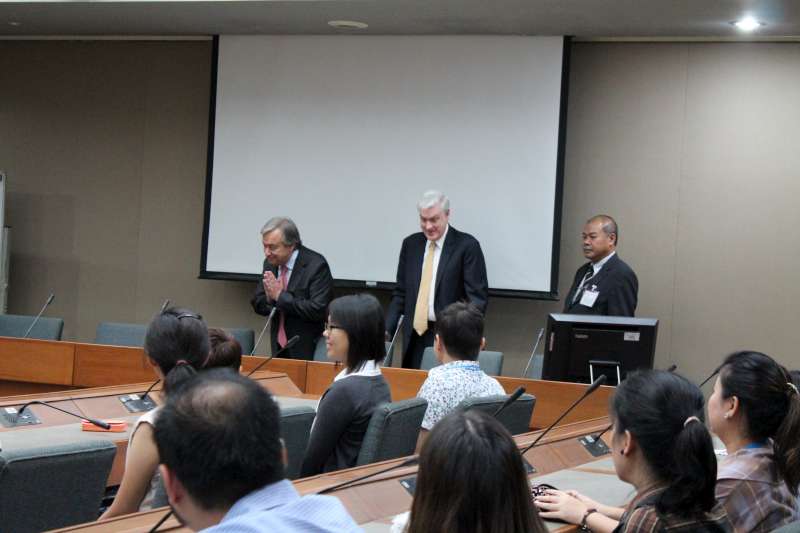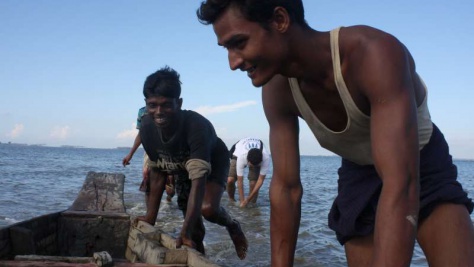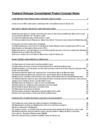High Commissioner for Refugees wraps up mission to Myanmar, Thailand
UNHCR finds wide support for only voluntary return of refugees from Thailand to Myanmar

UN High Commissioner for Refugees António Guterres gave staff in Bangkok a traditional Thai greeting as he concluded his mission to the region today. © UNHCR/S.Bhukittikul
BANGKOK, Thailand, July 13 (UNHCR) - UN High Commissioner for Refugees António Guterres has concluded a five-day trip to South-east Asia with agreements in both Thailand and Myanmar that refugees should only return home voluntarily, in safety and in dignity - and should be able to stay home when they do go.
"We don't want the refugees of today to become the irregular migrants of tomorrow," he said.
Meeting Thai Prime Minister Yingluck Shinawatra, he thanked Thailand for its generosity in hosting tens of thousands of Myanmar refugees for more than two decades. The two reached "a solid agreement" that refugees should only go home when they choose to do so.
Earlier in Myanmar, Guterres told President Thein Sein and other senior officials that UNHCR supports peace-building in the south-east (the area from which refugees fled to Thailand) through assistance to displaced people.
"We are ready to help prepare for returns, which should be voluntary and carried out in safety and dignity, both of those displaced within the country and from the nine refugee camps in Thailand," he told the president and other authorities.
Both in Myanmar and in his meeting in Bangkok with the secretary general of Thailand's National Security Council, Wichean Potephosree, all sides agreed that the return of many of the 150,000 refugees now in nine camps in Thailand must be sustainable.
All sides also agreed to work together to create security, economic and social conditions on the ground to make returns successful and ensure that refugees will be able to make a living when they go back. "No one wants refugees to go home, only to have to flee again," Guterres said, "Or, worse yet, become displaced within their own country."
Less encouraging were recent disturbances in Myanmar's western Rakhine state, but there UNHCR has been delivering - and will continue to deliver - humanitarian aid to both displaced communities, Rakhine and Muslim, without discrimination.
"We believe that this can be a factor for reconciliation between communities and we hope that a situation will be established in Rakhine state with the rule of law prevailing, with a human rights-based approach," Guterres said.
The High Commissioner also expressed concerned for the status of the 800,000 stateless Muslims of northern Rakhine state.
He told President Thein Sein and the Myanmar government he hoped that - independently of possible improvements in the nationality law - nationality would be granted to the members of the Muslim community who are entitled to it under the present legislation.
"Others should receive a legal status that would grant them the full enjoyment of rights required to develop a normal life in the country," he added.
On Friday night, the High Commissioner was to travel to Ethiopia for the Africa Union summit and for a field mission on Monday to see conditions for refugees from Sudan's Blue Nile State.
By Kitty McKinsey in Bangkok, Thailand
Related news and stories
UNHCR statement on Bangladesh, Myanmar bilateral pilot project on Rohingya returns
UNHCR, partners seek $876m for Rohingya refugees facing 'chilling fog of uncertainty' and for Bangladeshi hosts
UNHCR seeks comprehensive regional response to address rise in deadly South-East Asia sea journeys
UNHCR urges States to act now to save lives in the Andaman Sea
Young Rohingya volunteers confront gender-based violence in crowded Bangladesh camps
Threadbare disability support faces uncertain future in Bangladesh refugee camps
Your search for « myanmar » matched 3031 results. Only the first 1,000 results are displayed. Displaying page 5 of 112 pages.
-

Myanmar's displaced wait for tide to turn
10 Dec 2012 ... PAUK TAW, Myanmar, December 10 (UNHCR) - For most of his life, Nu Ah Len saw boats as a means of livelihood. Living in the coastal area of Pauk Taw in western Myanmar's Rakhine state, the 49-year-old ...... -

UNHCR Global Appeal 2015 Update - Myanmar
1 Dec 2014 ... | UNHCR Global Appeal 2015 Update • Myanmar • 1 | Planned presence Number of offices 12 Total ... information at time of planning (mid-2014) MYANMAR | Overview | Working environment Fresh ...... -

Bangladesh: Joint Assessment Mission (2012)
31 Dec 2012 ... 1 JOINT ASSESSMENT MISSION Myanmar Refugees in Cox’s Bazar District, Bangladesh December 2012 ... for Refugees (UNHCR) JOINT ASSESSMENT MISSION Myanmar Refugees in Cox’s Bazar District, Bangladesh ...... -
Briefing on Myanmar at the United Nations Security Council
13 Feb 2018 ... for three years, and then returned to Myanmar as part of an organised voluntary repatriation ... outflow of more than 688,000 refugees from Myanmar to Bangladesh began, driven by violence and ...... -

Myanmar: third plane of UNHCR airlift reaches Yangon
16 May 2008 ... UNHCR's third plane has landed in Myanmar's main city, Yangon, carrying supplies from our emergency ... Thursday's flight brings UNHCR's assistance trucked and airlifted into Myanmar since 10 May to 119 ...... -

Thailand Refugee Consolidated Project Concept Notes
1 Jul 2008 ... OF ID CARDS FOR CAMP-BASED MYANMAR REFUGEES IN THAILAND 2 SECURITY FROM VIOLENCE AND EXPLOITATION 4 2) PREVENTING SEXUAL ABUSE AND EXPLOITATION IN THE THAILAND/BURMA REFUGEE CAMPS 4 3) SAFE HOUSE ...... -

First Myanmar refugee returns from Thailand under way
25 Oct 2016 ... This week sees the first pilot voluntary returns of Myanmar refugees from Thailand, an initiative ... Further reintegration assistance will be provided by the Myanmar authorities, UNHCR and other ...... -

UNHCR Global Report 2009 - Myanmar
1 Jun 2010 ... Myanmar l A broadening of the humanitarian space in northern Rakhine State was demonstrated by an ... needs to receive TRCs. l In south-eastern Myanmar, approximately 50,000 people affected by ...... -

Myanmar: UNHCR builds houses, peace of mind for Cyclone Nargis victims
28 Jul 2010 ... KANASO NGU VILLAGE, Myanmar, July 28 (UNHCR) - In the horrible trail of destruction left by Cyclone ... the 10 deadliest cyclones on record, and certainly the worst natural disaster ever to hit Myanmar. ......
